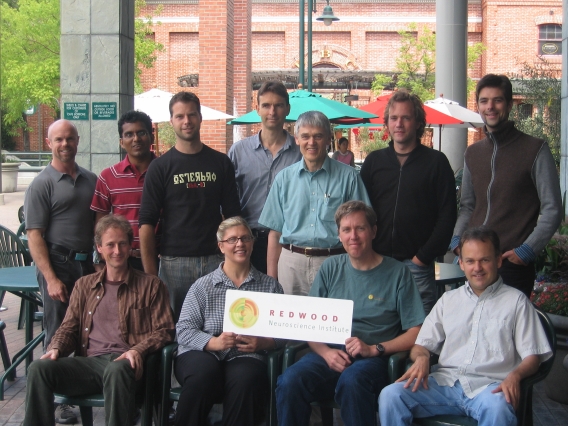History
The Redwood Center for Theoretical Neuroscience was established in July 2005, when the Redwood Neuroscience Institute was gifted to UC Berkeley. The Redwood Neuroscience Institute (RNI) was a private, non-profit research institute located in Menlo Park, founded by Jeff Hawkins in April 2002. The goal of RNI was to develop a theoretical framework for the thalamo-cortical system. Its staff consisted of principal investigators, postdocs, and students who worked closely together and shared this common vision. It fostered a vibrant intellectual environment that lead to the development of many new ideas. RNI also sponsored a weekly seminar series, as well as a guest speaker series at Stanford and occasional symposia.
RNI staff pictured at Cafe Borrone, just downstairs from the office at 1010 El Camino in Menlo Park. Back row (left to right): Bill Softky, Dileep George, Thomas Lauritzen, Fritz Sommer, Pentti Kanerva, Kilian Koepsell, Matthias Bethge. Front row (left to right): Tony Bell, Teri Fry, Jeff Hawkins, Bruno Olshausen.
Among the accomplishments of RNI:
- The book On Intelligence. (Hawkins in collaboration with Sandra Blakeslee, NY Times)
- Development of the Hierarchical Temporal Memory (HTM) model of cerebral cortex, which formed the basis of startup Numenta. (George/Hawkins)
- Discovery that spike timing in LGN neurons is phase-locked to retinal oscillations and transmits a parallel stream of information to cortex. (Koepsell/Sommer in collaboration with Judith Hirsch lab, USC)
- Development of a novel sparse coding algorithm that accounts for the diversity of receptive fields found in cortical area V1. (Sommer in collaboration with Martin Rehn, KTH Stockholm)
- A critical analysis of what is actually understood about the function of cortical area V1. (Olshausen in collaboration with David Field, Cornell)
- Development of an information-maximization theory of spike timing dependent plasticity (STDP). (Bell)
- A rigorous comparison of ICA and PCA in terms of actual coding efficiency for natural images. (Bethge)
- Development of a theory of predictive coding in the thalamo-cortical loop. (Softky)
- Analysis of the conditions under which dendritic inputs combine super-linearly within dendrites. (Lauritzen)
- Development of population coding models based on random distributed representation in high-dimensional spaces. (Kanerva)
Publications arising from work at RNI may be viewed here.
RNI was funded by the Strauss-Hawkins Trust. It closed in June 2005, at which point its assets were gifted to UC Berkeley to establish the Redwood Center for Theoretical Neuroscience. The gift funds an endowment that supports ongoing programs of the Redwood Center, as well as the graduate program and administration of the Helen Wills Neuroscience Institute.

